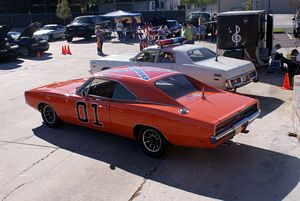|
By accessing or using The Crittenden Automotive Library™/CarsAndRacingStuff.com, you signify your agreement with the Terms of Use on our Legal Information page. Our Privacy Policy is also available there. |

The American Road #10: Goodbye General Lee
|
|---|
|
|
 Opinions expressed by Bill Crittenden are not official policies or positions of The Crittenden Automotive Library. You can read more about the Library's goals, mission, policies, and operations on the About Us page.
Opinions expressed by Bill Crittenden are not official policies or positions of The Crittenden Automotive Library. You can read more about the Library's goals, mission, policies, and operations on the About Us page.
"The American Road" is a series of articles for British readers of DriveWrite Automotive about what it's like to be an American driver.
 Topics: General Lee
Topics: General Lee
|
The American Road #10: Goodbye General Lee
Bill Crittenden
June 29, 2015
You might have heard that the Confederate flag is a bit controversial here in the States all of a sudden since nine African Americans were gunned down in a church in Charleston, South Carolina. It's even seeped into the automotive news, with Warner Bros. canceling licensing of models of the flag-adorned "General Lee" Dodge Charger and NASCAR issuing a statement about their non-use of a flag quite popular at stock car events across the American South.
The General Lee
From
an article published June 25, 2015
Following the tragic murders of nine African Americans by a white supremacist in Charleston, South Carolina last week, there has been a renewed push to remove the Confederate battle flag from state houses, state flags, and retailers. Proving yet again that almost any issue can be tied to cars in some way, the widespread takedown of the flag has killed the General Lee.
For those who don't remember, "General Lee" was the name of an orange 1969 Dodge Charger driven by the protagonists of the Dukes of Hazzard television show (1979-1985) and movies (2005 & 2007). The car had a big, NASCAR-style "01" on the door, the name General Lee over the windows, and a huge Confederate battle flag painted across the roof.
And the intellectual property of the series belongs to Warner Bros., a family-oriented company that has decided to preempt any sort of protest or backlash by pulling the licensing of products featuring a symbol of "southern pride" to a few and of ignorance & racism to many.
"Warner Bros. Consumer Products has one licensee producing die-cast replicas and vehicle model kits featuring the General Lee with the confederate flag on its roof — as it was seen in the TV series. We have elected to cease the licensing of these product categories." - Warner Bros. statement
The model kit licensee was a company called Round 2, which is a toy maker specializing in reissuing vintage and retro toys including MPC and AMT model kits. It's unclear who the die cast licensee was, but Ertl has produced a 1:18th scale die cast replica in the past.
Warner Bros. could have continued to license the vehicle sans Confederate flag, but as I've seen that the typical model car collector isn't much interested in inaccurate, edited-for-content replicas (such as NASCAR models with beer logos removed or edited), this probably makes production of the General Lee without the flag financially unfeasible. Warner Bros. seem to know this, too, citing a minimal loss of sales clarifying its statement to Yahoo! Autos saying that they wouldn't be licensing a General Lee without the flag, either.
The small amount of money it brings in just isn't worth the trouble right now. Maybe it won't ever be again.
But even without the flag, the damn name of the car is the "GENERAL LEE," named for the Confederate general who led the Army of Northern Virginia against the United States in the Civil War. Even to this northerner
with family history on both sides of the front lines, General Robert E. Lee should be honored as a brilliant military strategist - but that is something better left to museums and history books and the military, not silly car chase TV shows or the merchandise they spawn. So I've never been a fan of the vehicle.
What's Wrong With the Confederate Flag?
Geoff had asked me if this wasn't getting a bit "over the top," speaking as an outsider. I have to admit that even as an American I'm learning more about this history every day now that it's in the news.
And what I'm reading just makes me hate the Confederate flag more and more.
Well, like any flag, it means different things to different people. One side considers it a symbol of racism and ignorance, one side considers it a symbol of Southern heritage and independence from the federal government.
However, the side that calls it "Southern heritage" are pointing to a very specific part of Southern history that no moral human being should be proud of.
Let's start with a little background information. The flag started in square form flown by the Army of Northern Virginia during our American Civil War so that the soldiers could more easily differentiate the sides of battle. The first official flag of the Confederate States of America (the south) was quite similar to the flag of the United States of America (the north). It was later incorporated into the upper corner of a new official flag of the Confederate States. The Army of Tennessee was the first to use it in the now familiar oblong full flag form.
Our Civil War was fought from 1861-1865, when eleven states seceded from the United States and formed their own new country. It was a very bloody turning point in American history, taking 620,000 soldiers' lives (we've lost just 644,000 in ALL other conflicts), officially calling an end to slavery with the Emancipation Proclamation, and starting us on the path toward racial equality that we're still struggling down.
There's a common thread of "states' rights" in arguments about the meaning of the flag and the Civil War. We occasionally have issues balancing the power of the federal government and the powers of our state governments. We were originally formed to be sovereign, independent states bound together by a common currency, open borders, and common defense (sound familiar?).
But, in the case of the Confederacy, the "states' rights" that the South was fighting for was quite explicitly said to be the "right" to own another human being as property and use them in forced labor. Take South Carolina, for example. This state, also the location of the recent Charleston murders, was the first state to secede, being quite explicit in stating that its reason was their desire to preserve slavery threatened by an abolitionist movement that culminated in the election of President Abraham Lincoln:
http://avalon.law.yale.edu/19th_century/csa_scarsec.asp
After the Civil War and emancipation, all manner of laws were passed to take away the civil rights of black Americans. Poll taxes and literacy tests prevented them from voting, and the Grandfather Clause (you were exempt from the taxes and tests if your grandfather voted) exempted poor illiterate whites from the same tough standards.
As the South invented these racist laws, the federal government in Washington slapped them down. Sometimes it was Congress, sometimes the Supreme Court, but the Confederate flag started popping up again as a symbol of resistance to the civil rights movement. It was a popular unofficial flag of the Ku Klux Klan and other white supremacists, the Dixiecrats (southern pro-segregation Democrats) adopted it as a symbol in 1948. Georgia adopted it as a part of their state flag in 1956 as a response to Brown v. Board of Education, the Supreme Court ruling ending school segregation.
All the while across the twentieth century hardly a peep was heard about states' rights when Washington was providing jobs through the TVA, kicking the Nazis' asses in WWII, or when northern taxes were building southern interstates, or when the U.S. Army stood between the them and the Soviet Union.
But an end to segregation? "STATES' RIGHTS!!! Washington can't tell states what to do!"
States' rights is a polite euphemism for a very specific set of "rights" the South wanted to claim, and the "brave Confederate soldier" they sometimes claim to be honoring was fighting for a very specific thing. As such, the Confederate flag is tied to "Southern heritage," but a very,
very
specific part of history in the South.
But racism isn't always assumed. We know that not everyone who flies the flag knows this history, and that's why it's also seen as a symbol of ignorance. But is ignorance really something to be proud of and advertise to the world?
Why Fight About It Now?
The fight against the Confederate flag isn't new. Georgia took it off of their state flag in 2001, and that same year Mississippi had a failed referendum to change their state flag.
In 2000, South Carolina voted to take it off of a prominent place atop its Capitol building dome, but in compromise it was raised at a Confederate memorial in front of the building. It is that memorial flag that visitors had to walk by as they went to view the body of South Carolina state senator Reverend Clementa Pinckney, lying in state after being killed in the massacre in Charleston.
We might all roll our eyes at Amazon and eBay banning Confederate flags from their marketplaces while still allowing Nazi paraphernalia to be sold, and almost all of us acknowledge that our freedom of expression forbids us from banning private citizens' displays of the flag. The importance we place on free expression is why we understand NASCAR removing the Confederate flag from all of any official use in their racing two decades ago, yet being unable to bring itself to ban fans from displaying the flag at their events even after Charleston.
Charleston merely brought attention to the fact that this flag has no business serving as an official symbol of a state government that is supposed to represent all of its citizens. This has been bubbling below the surface of the national consciousness here for decades, but in the past efforts to take the Confederate flag down were mostly met with a "we've got better things to do" attitude. But not now. Sometimes we need a little shock to remind us of what's important, as the attention on the violence against voting rights marchers in Selma helped get the Voting Rights Act passed, or how the assassination of Martin Luther King Jr. was the push needed to get Congress to pass the Fair Housing Act.
Hopefully we can get that damned flag and all of the associated symbolism of the Confederacy taken down from our state houses before we get distracted by something else.

















 Opinions expressed by Bill Crittenden are not official policies or positions of The Crittenden Automotive Library. You can read more about the Library's goals, mission, policies, and operations on the About Us page.
Opinions expressed by Bill Crittenden are not official policies or positions of The Crittenden Automotive Library. You can read more about the Library's goals, mission, policies, and operations on the About Us page.
 Topics: General Lee
Topics: General Lee
 Photo by "Valder137," used under Creative Commons Attribution 2.0 Generic License.
Photo by "Valder137," used under Creative Commons Attribution 2.0 Generic License.
